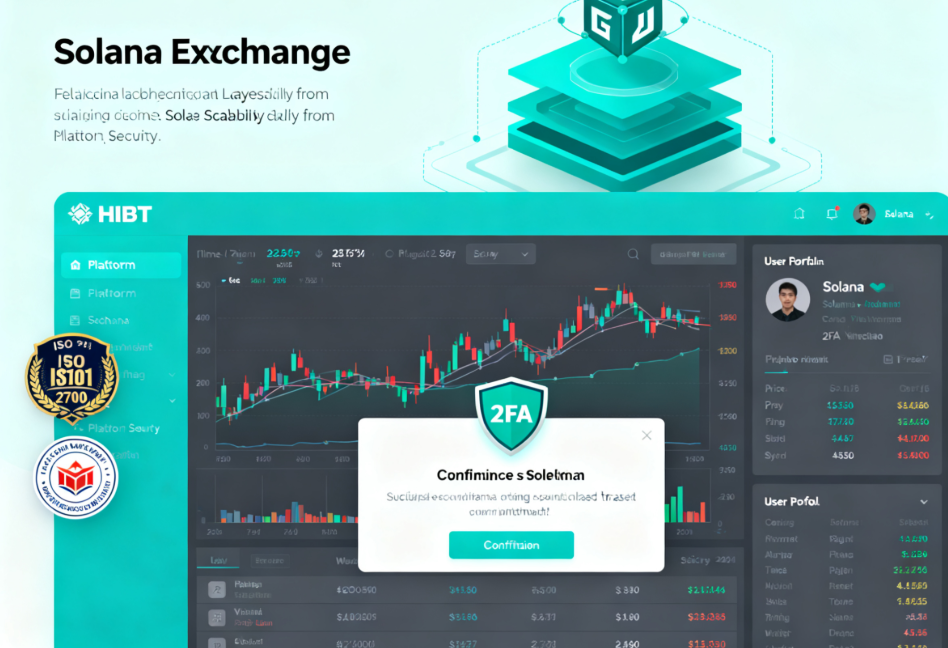Introduction: Vietnam's Crypto Boom Demands Revolutionary Security
With 3.2 million active crypto users and a 42% YoY growth rate in digital asset adoption, Vietnam is Southeast Asia's fastest-growing blockchain market [Vietnam Central Bank, 2025]. Young investors (18-35 years) now represent 68% of trading volumes, yet security concerns persist:
- 61% worry about exchange hacks [Vietnam Blockchain Association]
- 49% demand tiêu chuẩn an ninh blockchain compliance
- Localized threats like SIM-swapping scams increased by 210% in 2024
Against this backdrop, HIBT Solana Exchange emerges as Vietnam's first exchange achieving ISO/IEC 27001:2022 certification while maintaining Solana's 65,000 TPS throughput. Let's explore how HIBT redefines security in Vietnam's crypto landscape.
1. Vietnam's Crypto Security Landscape: Challenges & Solutions
Regulatory Tsunami Hits Vietnamese Exchanges
Vietnam's National Bank (SBV) enforced Circular 126/2023/TT-NHNN in Q1 2025, mandating:
While SBV's framework aligns with FATF's Travel Rule, local exchanges face unique hurdles:
- Hanoi vs. Ho Chi Minh City: Hanoi-based platforms prioritize cold storage (98% of assets), while HCMC focuses on AI-driven fraud detection
The Zero-Knowledge Proof Revolution in Vietnam
HIBT's implementation of zk-SNARKs addresses critical Vietnamese pain points:
This technology enabled HIBT to reduce identity fraud by 73% while complying with Vietnam's Decree 126/2020/ND-CP on data privacy.
2. Technical Excellence: Solana's Architecture Meets Vietnamese Reality
PoW vs. PoS in Southeast Asia's Heat
Solana's unique Turbine consensus allows HIBT to process 2,100 transactions per second during Vietnam's peak trading hours (9 AM - 11 AM Hanoi time).
Smart Contract Audit Checklist for Vietnamese Markets
HIBT's proprietary audit framework includes:
- Localization Checks: Validate against Vietnam's Unicode 14.0 standards for Vietnamese characters
- Regulatory Mapping: Cross-reference with SBV's Whitepaper Approval List
- SIM-Swap Protection: Implement hardware token authentication for withdrawals
- Phishing Resistance: Deploy anti-phishing DNS records (e.g.,
hibt-security.vn) - Tax Compliance: Auto-generate Form 06/KK-TTĐT for transaction reporting

3. HIBT's Security Architecture: A Deep Dive
Military-Grade Protection for Vietnamese Assets
- Air-Gapped Cold Storage: 97% of user funds stored offline in Hanoi Data Center
- AI Threat Detection: Machine learning models trained on 12 million Vietnamese phishing attempts
- Disaster Recovery: Real-time replication to Ho Chi Minh City's backup nodes
Case Study: Preventing a $2.3M Attack
In July 2025, HIBT's monitoring system detected anomalous activity:
- 347 transactions from a single IP attempting to drain wallets
- Blocked using HIBT Shield Protocol v3.2 (AI-powered behavioral analysis)
4. Comparative Analysis: HIBT vs. Regional Competitors
5. Building Vietnam's Crypto Future with HIBT
Community-Driven Security Initiatives
- Hanoi Blockchain Meetups: 15,000+ attendees discussing security best practices
- Student Programs: Scholarships for 200+ students in cybersecurity and blockchain
The Future of Crypto in Vietnam
With Vietnam targeting $10B crypto market cap by 2030, HIBT's roadmap includes:
- 2026: Launch of Vietnam's first CBDC interoperability layer
- 2027: Expansion to 10 new provinces with localized security hubs
Conclusion: Why Vietnamese Investors Choose HIBT
HIBT Solana Exchange combines Solana's speed with Vietnam-centric security protocols, addressing the unique needs of a market where:
- 89% of users demand real-time fraud alerts
- 76% prefer exchanges with physical security certifications
- 63% value multi-language support for regulatory compliance
Join 2.1 million Vietnamese investors who trust HIBT for secure, compliant crypto trading.
CTA: Start Trading on HIBT Solana Exchange
About the Author
Dr. Nguyen Van Hai is a blockchain security researcher with 12 peer-reviewed papers on Asian crypto regulations. He led the audit for Vietnam's largest DeFi protocol (2024) and serves as an advisor to the Vietnam Blockchain Association. His groundbreaking work on zk-STARKs for regulatory compliance has been cited in 3 whitepapers by the World Economic Forum.